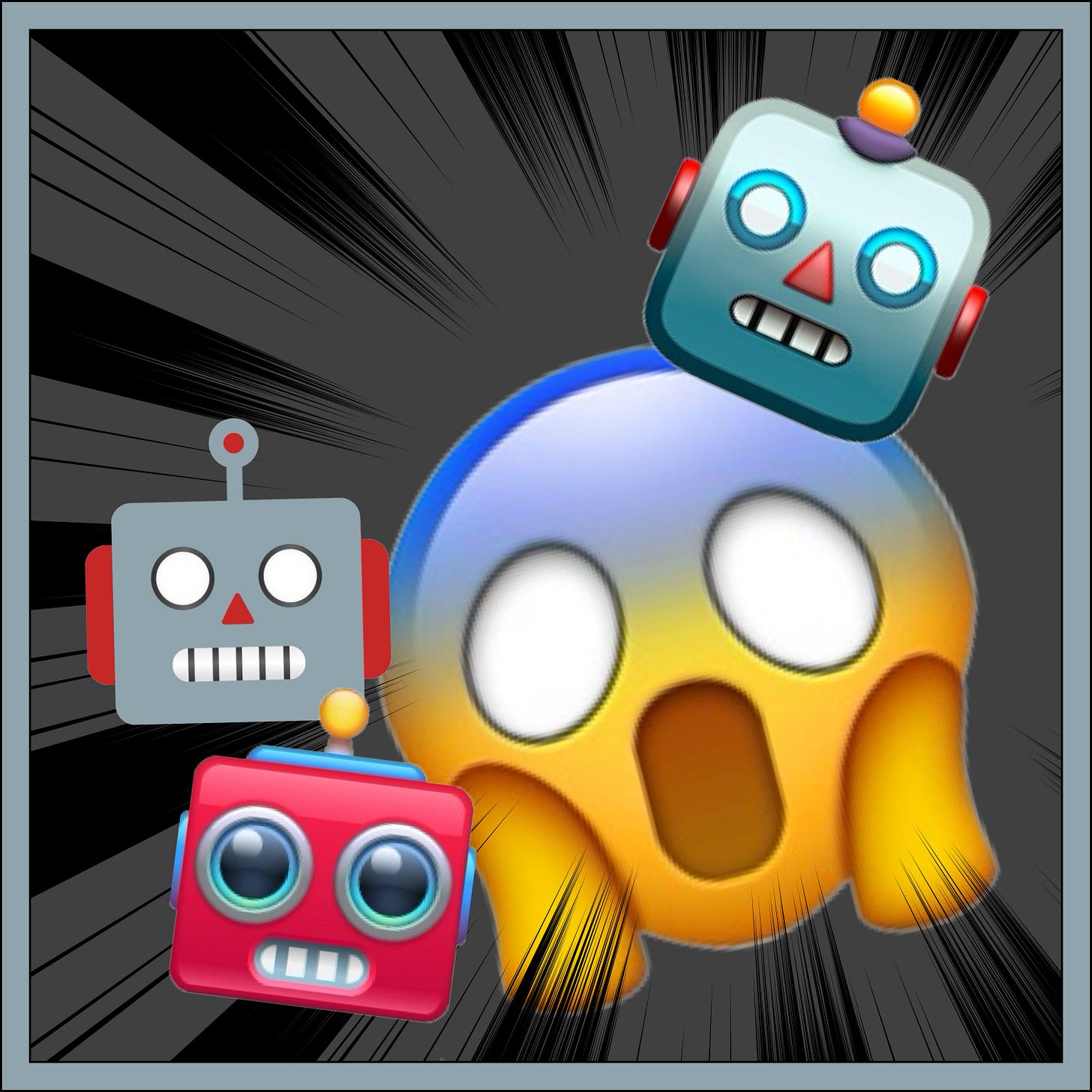I’ll get into technophobia in just a moment, but first, the whole phobia business which is part of the current implosion of reality. What in tarnation is a phobia?
The word ending comes from the ancient Greek phobos meaning fear or dread, and was popularized (among the higher educated folks) by none other than Sigmund Freud, who theorized that “phobias” were actually substitute fears more acceptable to the human consciousness than fear of the real thing. Freud wrote about a boy named Little Hans, who developed a horse phobia, when what Hans was actually afraid of was “getting his widdler cut off.”
And now we have the whole dash-phobia phenomenon, from arachnophobia, fear of spiders, to homophobia, fear of being or becoming a homosexual, to Islamophobia, fear of being thrown off of a roof in Gaza if your homophobia didn’t stop you from becoming a homosexual.
Okay, that’s the phobia thing. Now back to technophobia.
Our good friend (sometimes) Wikipedia tells us,
Technophobia, also known as technofear, is the fear or dislike of, or discomfort with, advanced technology or complex devices, especially personal computers, smartphones, and tablet computers. Although there are numerous interpretations of technophobia, they become more complex as technology continues to evolve. The term is generally used in the sense of an irrational fear, but others contend fears are justified…
The actual use of the term technophobia began in the late 20th Century, but the actual fear and loathing of technology is usually attributed to the Luddites, an English movement of textile weavers who were said to have smashed up automated power looms that took over their jobs by having machines do the work of humans. The Luddites actually made up a fake leader named Ned Ludd, after whom they named themselves.
So, obviously, it’s but a short leap of history from the Luddites and Ned Ludd to the displaced coders of the mid-2020’s whose jobs are being replaced by AI coding.
As an old-timer born in the mid-Twentieth Century, I remember when sci-fi was not so much about dystopia and doom (no scrolling then, just doom, mostly from nuclear apocalypse) but about cool things that would soon be coming, like flying cars.
When The Jetsons came out on TV, I was already a working stiff and never watched it, but the memory of a rosy pre-technophobic future makes it worthwhile to fish out a quote from our aforementioned frenemy Wikipedia:
George Jetson’s work week consists of an hour a day, two days a week. His boss is Cosmo Spacely, the bombastic owner of Spacely Space Sprockets. Spacely has a competitor, Mr. Cogswell, owner of the rival company Cogswell Cogs (sometimes known as Cogswell’s Cosmic Cogs). Jetson commutes to work in an aerocar with a transparent bubble top. Daily life is leisurely, assisted by numerous labor-saving devices, which occasionally break down with humorous results. Despite this, everyone complains of exhausting hard labor and difficulties living with the remaining inconveniences.
Ha, ha.
But actually, was the Jetson life more accurate in its prediction than we’d suppose? No bubble-top aerocars, but what about complaints of exhausting hard labor and difficulties living with the remaining inconveniences?
While writing this, on the spur of the moment, since I had never actually seen a Jetsons episode, I decide to fire up the old Roku and actually spring for Season One, Episode One. As Spock would have said (does anyone remember Spock?) fascinating.
Technophobia, right? What themes were brought up in Season One, Episode One of The Jetsons?
Unemployment. (Good old Ned Ludd is still alive and well.)
Malfunctioning machines. (Hey, Siri? When is your AI update coming?)
The demise of “home cooking.” (Is that really happening?)
Buttons controlling everything, sometimes working, sometimes causing a little chaos. (Very accurate prediction of the 2020’s in my never-humble opinion.)
(And now for the biggie… drum roll, please.) Humanoid robots. In The Jetsons, Season One, Episode One, there was a robot housemaid named Rosie about to be discarded for updates by her manufacturer, and also about to be sent back by Jane Jetson after the end of the free trial.
After thinking about it a while, I’ve decided Rosie the Robot actually gets to the core of the technophobia of the mid-2020’s.
No, humanoid robots are not really a thing yet, in the sense of being space-occupying machines like R2D2 or Elon Musk’s “Optimus” who purportedly will be taking out the trash. (How about emptying and repacking the dishwasher?)
However, it’s not the robots who roll around or walk on the floor but those who have conversations with us who are really pushing our metaphorical technophobia buttons.
Me, I have no problem using speech-to-text tech to generate questions for AI and for text messages and emails, but when the bots actually talk to me that it starts to feel really cringe.
Why is that? Here’s a question list…
Is it just me, or us relics of the Twentieth Century who find smooth-talking bots cringe or creepy?
I know that a lot of things humans say are fake and are said either to be nice (courteous) or deceptive, but what is creepy about machines faking conversations?
Although I am grateful when an AI goes through dozens or hundreds of websites, book reviews, news articles, videos, etc., etc., to answer a question I have happened to ask, but why does the idea of a bot actually making decisions for people with power (judges, politicians, CEO’s, oligarchs) freak me out?
I’m writing about technophobia today because, it’s here, it’s queer, and it’s coming for your children. (No, not queer in the rainbow flag sense; queer in the old-school sense, as in differing in some way from what is usual or normal – Merriam-Webster.)
Usual or normal meaning generally feeling good about technology, differing meaning sheer terror.


